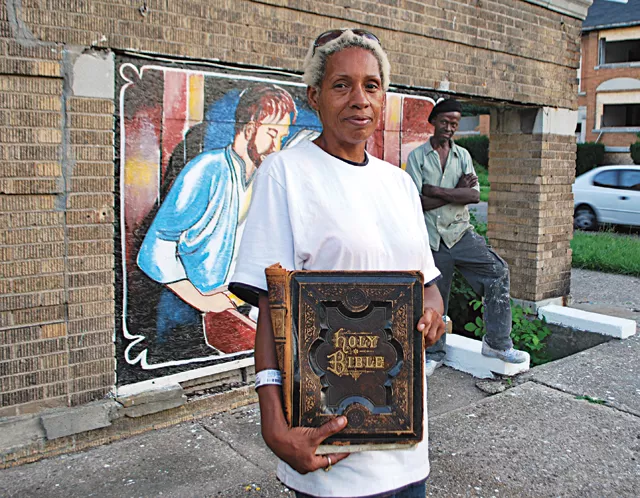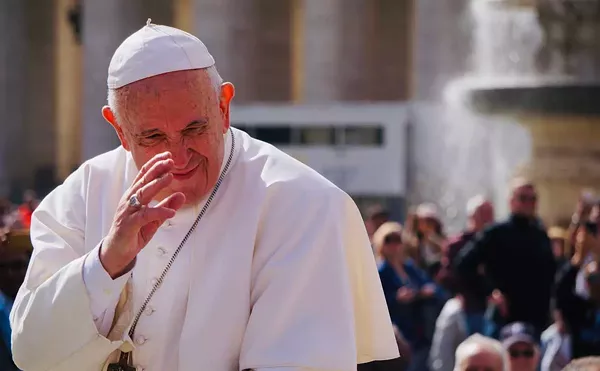
Audio By Carbonatix
[
{
"name": "GPT - Leaderboard - Inline - Content",
"component": "35519556",
"insertPoint": "5th",
"startingPoint": "3",
"requiredCountToDisplay": "3",
"maxInsertions": 100,
"adList": [
{
"adPreset": "LeaderboardInline"
}
]
}
]

God speaks to her. She goes to sleep at night and by morning he tells her what he wants her to do. He told her to transform that empty apartment building across the street. He told her to clear the field where that little girl got raped. And he told her to take all those homeless people and prostitutes into her own home.
"I speak to you just like he speaks to me," says Kathina Carey. "If you truly believe and trust in God, he's going to talk to you. It'll be just like somebody sitting beside you."
The 50-year-old lives on Goethe at McClellan on the city's east side in a crumbling area of waist-high fields and long-empty houses. This is a very old neighborhood, and her roots here run deep. Her great-great-grandmother lived just houses from where Carey does now, back when nearby Mack was a dirt road and horses trotted past their street. Her great-grandmother lived on the block too, as did her grandmother, and her mother after that. It's been Carey's neighborhood all her life, and she made it her duty to care for those in it.
"The prostitutes didn't have nowhere to stay or eat or none of that, so I just started asking God what to do, so they just started coming to my house one by one, needing clothes or showers," Carey says.
But her guests have taken over her home. Strangers come and go at will and she lets them, despite the fact that they sometimes rob her blind or get in booze-fueled fights on her property, despite the fact that she shares the home with two 11-year-old sons and a 14-year-old one, and until recently a husband who became so overwhelmed by the invasion that he moved out, back to his parents' house.
"He don't want to deal with the people off the street," she says. "He thinks I'm crazy. My children are so upset because they don't have the same kind of love that I have for Jesus and people, and I've opened my house to people to the point where just strangers come now, and they really get upset sometimes because most of them be drug users and prostitutes and homeless people."
As she speaks, they swarm in the street around her. Several are seated under the shade of a tree in an empty field, drinking from brown bags. Young men loiter on the street corner. Neighbors wander over to say hi and hang out in her yard, because they know they always can.
Because Kat, as they call her, will never say no to anyone. If someone wants money, she gives it to them. If they're hungry, she gives them food. And if they want to treat her home as their own, she lets them. Without articulating it, she's trying to live a life of pure Christianity, of truly selfless giving of everything she has. Even if it brings harm to her.
"I was brought up in the church and I was taught to serve the people, because that was an important part of what Christ did, and in order to get in the kingdom of heaven you must, in God's light, walk the way that Jesus thought the Earth should come together," she says in her dreamy, lilting voice. "You must do some of those things in order to get into heaven." It wasn't long before God's words began visibly changing this block.
One night, not long ago, God revealed to her his biggest task yet. She began receiving visions of beautiful scenes from the Bible, and she was told to display these images to this fallen neighborhood. Suddenly, the drab apartment building on the corner was shining forth with brightly colored tableaus. And though these works are her doing, she insists they're not really her doing.
"I drew the pictures how God gave them to me," she says. "I go to bed at night and I pray. I ask God to show me what to do the next day. And he does."
God has been telling her things that needed doing in her neighborhood for a while now.
He inspired her to start mowing the grass on the empty lots within her sight, some nearly a block away. She cleared the alley of all the stray trees growing from the fence line. She made a community park out of the empty corner lot where a half-dozen homes once stood. It's got flowerbeds, lanterns hanging rustically from tree branches, and in the middle is the foundation of a pond that has yet to be finished.
Not long ago, the broken chunks of a long-gone home's foundation were scattered on it, making it impossible to mow, and no matter how many times she called the city for help in clearing them, she says, she got little response.
Then, one day, word spread that a little girl had been dragged there and raped in the tall grass growing around all those rocks.
When Carey heard the news she was so angry, all she could think to do was grab a shovel and start furiously digging a hole in the middle of the lot, as if to single-handedly wipe clear the stain of the sin that just occurred there.
"Before I knew it, I was in a hole this big," she says, spreading her arms wide. "I was just putting all the anger I had into that hole, and when I got up the next morning the Lord said, 'I'm gonna show you what to do with that hole.' He took me over to them bricks over there and I put those bricks around in a circle, and that's how that pond got started."
She also created a pond in front of her house, with fish swimming in it and wildflowers growing around it, making her yard an island of beauty on her weedy street. Soon, people started instinctively throwing coins into the water and making wishful prayers, like a form of folk magic. And just as instinctively, some of the same people started helping themselves to that money in the pond. Although she doesn't care about the money so much, Carey does draw a line when it comes to people's prayers.
"Everybody that makes a wish in there I tell them, 'Remember, you're sending a blessing out to Jesus, and if you want your blessing to come true like everybody else's, you can't go in that pond and touch nothing. When you go take that money out you're stealing someone's blessing, and the more you steal out of that pond the more God gonna whoop you.' And it's been less thieves taking money out of that pond now."
As the neighborhood came alive again, and the drabness gave way to color bursting out from flowerbeds and paintings, neighbors started showing up to help. "I was running out of money and I told the Lord, 'I ain't gonna stop, but I need some help,' and God started sending people gradually. Sometimes one come and dig a hole, sometimes one cut the grass."
And sometimes people give her money. She has no job, but instead relies, she says, on God to give her what she calls "financial blessings." She gets enough money here and there to buy a new tool or two sometimes, or paint for the art project, or replacements for the lawn mowers and tillers that people keep stealing from her yard. She's also bought two empty houses on the block from the city. Of course, she just turned them over to others who had no place of their own to stay.
But she might need one of them soon for herself. "That's actually the one I'm trying to move in now because the people has taken over this one," she says, standing in her front yard, pointing to an old red house across the field.
That apartment building sat abandoned for years. It's a three-level, multi-unit shell with all its windows gone and its doors pried open. Carey watched every day as the junkies went inside to shoot up and nod out, as the hookers took their dates in there, as the homeless spent their nights in there. It lingered in the neighborhood like a tumor, sapping the strength of everything around it. Then the visions were given to her.
First thing she did, she says, was board up the windows herself. "It cost me $700 cash to do all the boards. I went to Home Depot and got 'em. I still got every receipt." Those boards would be her canvases.
She can draw a little, but she couldn't match the splendor of the religious imagery in her mind. That's when, she says, God brought her Leon the painter.
Well, a prostitute did, actually. "This young lady that works on Mack, she dates guys on Mack. He brought her to my house to get her something to eat. I went to bed at night, the Lord said, 'That's who you're gonna get because he's going to work with you side by side and he ain't gonna hold you up.'"
Leon Goodin has been a sign painter for years, putting colorfully stenciled ads on the brick walls of mom-and-pop shops all over the city. A few days later, Carey approached him as he stood by his work truck and said with sheer certitude, "Mr. Leon, I got an ongoing project that I'm going to need your help with."
For some reason he was drawn to this woman and her inspired, idealistic personality. She even got him to start attending church regularly for the first time in years, as she has with other neighbors. She doesn't proselytize so much as present a serene hopefulness in the midst of the misery around her that draws her neighbors to her like moths to a light.
But Goodin, like many of Carey's friends, worries about her boundless generosity. "She's too nice," the 61-year-old painter says. "People are trying to tell her that. But if someone asks for something, if she has it she gives it to them. People be trying to tell her, 'Don't give everything away like that!'"
At first, Carey paid Goodin for his help, but as the project grew in time and scope, she wasn't able to cover the cost. And he began skipping paying jobs to instead continue this work.
"Mr. Leon didn't accept no money no more, so I have to sometimes just push the money on him," Carey says." It's only enough to get gas and paint, but basically Mr. Leon has been doing the painting for nothing. He works for me in between his jobs, and sometimes he don't go on his jobs."
The first painting went up on the side of the building facing McClellan. It shows Lucifer as he's thrown out of heaven in a burst of pastel colors. Alongside him are comet-like spheres containing fellow fallen angels being cast out of paradise. It depicts what she sees as the root cause of the bad things in the neighborhood.
"There was so much happening around here," she says. "The women was getting stabbed on Mack. The prostitutes didn't have nowhere to stay or eat or none of that. I put that up because I couldn't understand why things was going so bad, and the first thing that came to mind was Lucifer."
The second is of Carey herself as an angel with a horn to her lips, with the caption "Kat Trumpeting Jesus." Then came images of Noah in his ark, John the Baptist in the river, Jesus in the manger, Moses on the mountain; all the iconic stories from the Bible that would be instantly recognizable, even by those who haven't thought about these tales since they were children. It was her way of confronting the chaos of the neighborhood with reminders of fundamental spiritual concepts. And to some degree, it worked.
"The more they can see up here, the more inspiration I believe they can get themselves," Carey says. "In my own family I see the change. Usually my family used to sit out here and get drunk and drink on the lots. They don't do that as much anymore. They get in and chip in now."
Valerie Brunson, a longtime neighbor, noticed it too. "For some reason it brought, like, a calming effect or something," the 48-year-old says, "'cause it used to be off the hook around here."
Carey sits in the shade of Mr. Leon's truck on a sunny afternoon, and she's trying to leaf through her ancient Bible, but her broken fingers can't turn the pages.
This thick book has been passed down her family through generations, since the 1800s. It's a magnificent edition, with intricate illustrations and exquisite lettering. She uses its baroque depictions of Biblical history as the basis for her paintings.
But her hand is useless right now because two homeless men who came to stay at her house last night got into a drunken brawl on her front porch, and as she tried to break it up her fingers got crushed in the doorframe as one man threw the other into the door. A neighbor used household tape to bind the fingers together. One of them was clearly broken; the knuckle was completely out of alignment. She hadn't gone to the hospital and didn't plan to. She's simply too busy finishing all her projects. Goodin gently prods her to go, she gently refuses. Like many inner-city residents, she can't or won't go to the doctor on her own.
As she emerges from the truck, neighbors gathered in the street once more, giving her hugs, admiring her the paintings and complimenting the sunflowers that grow near the sidewalk.
"This is sharp. This is sugar-sharp," Brunson says of it all. She's a community activist, a former female boxer, a tough woman whose voice becomes tender and soft about the beauty that's bloomed on this ruddy block. "People be just amazed. They be like, 'Y'all in the hood doing this?' But all this is strictly community. There's so much positive going on but they're only highlighting the negative, so everyone thinks Detroit is so shitty. I got people that come in from out of town that be like, 'I love it here,' but their perception of it is bad because everybody think everybody is bad."
A man walks up with a bag of food as Carey sits in Mr. Leon's truck, still trying to leaf through that beautiful old Bible. "And we have this one right here that brings bread and stuff for the people that come and eat. I can't always feed them out of my pocket," Carey says. She softly tells the man, "OK, put them in the house."
He turns and walks in Carey's front door like it's his home, just like everyone else out here does, because for anyone who wants it to be, it is. Just as God told her he wants it to be.
Detroitblogger John scours the city for Metro Times. Send comments to letters@metrotimes.com.





